

KENNESAW, Ga. | Sep 3, 2021
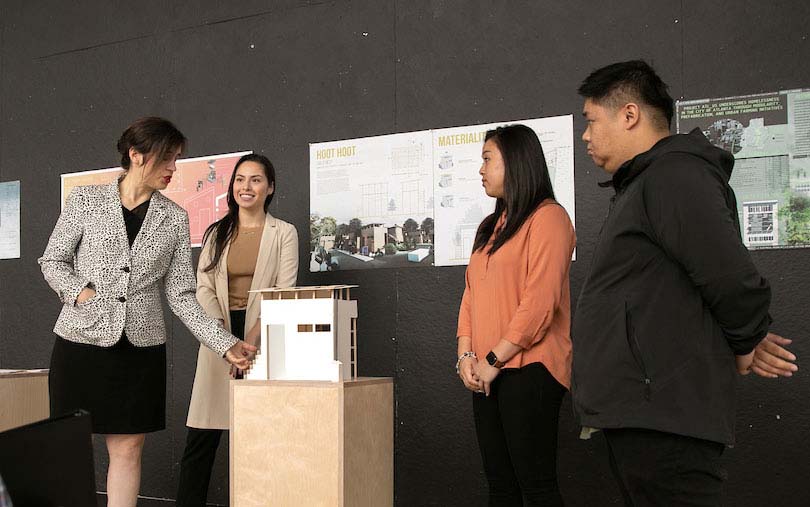
Carolina Montilla knew she wanted to influence the built environment shortly after earning her architecture degree from Kennesaw State University in 2010. However, she didn’t anticipate her undergraduate experience would influence her approach to architectural research to the extent she would make a career out of it.
Now a strategy director at Gensler, Montilla said architectural research is a unique way to study how humans interact with their environments. By conducting research throughout her undergraduate and graduate studies, Montilla discovered that architecture can go beyond conceptual design based on formal principles and a purely vernacular approach, and architects can actually have a profound impact on society as ambassadors of change.
“In general, the architecture world is very attached to the human experience, and most of our projects start with trying to unpack that experience from an ethnographic perspective before thinking of built solutions to understand that experience,” Montilla said. “For years, architecture has been about the product and the built environment, but architecture becomes very powerful when we’re able to connect the dots and see how a building can influence a city and society.”
Montilla’s experience is anything but an anomaly, said Liz Martin-Malikian, thesis coordinator and academic outreach liaison in Kennesaw State’s Department of Architecture. Every day, KSU architecture students are pushed to engage in research through the department’s thesis process and by working alongside faculty and other industry experts in studio courses. To further encourage the notion that architecture can serve as a valuable research application, Martin-Malikian has organized and moderated an expert panel in recent years titled, “Is Doing Architecture, Doing Research?”
The answer, she said, is a resounding, “Yes.”
“Architecture is doing research, but not in the traditional academic way,” Martin said. “The language that architecture uses for research is more centered around visual references. Bringing text-based and image-based sources together is something we want to expose our students to as a way to bridge to practice. I like to think of architectural research as closing the knowledge loop between practice and research in order to pinpoint issues and propose creative solutions within the built environment.”
Thesis prep, research and studio courses offered by the department of architecture allow students to conduct research and identify topics that combine architectural principles with their personal interests. According to Martin-Malikian, many of these students continue researching their thesis topics even after they’ve completed their undergraduate studies.
In addition to traditional academic studies of history and theory, building science, and sociology, research by design has the potential to bring another dimension to research in the field, Martin-Malikian said. The Department of Architecture is developing two categories for architecture students to focus their thesis interests: project-based research and research-based projects.
Kena Fairfax, a fifth-year architecture student at KSU, has centered her project-based thesis on the issue of homelessness and how architecture can be used to offer solutions. The topic draws from her childhood dream to help provide shelter for those in need around the globe. Through the thesis prep course, Fairfax has been able to develop her project into something she can carry into the future.
“My thesis is about creating module pods for homeless communities,” Fairfax said. “It is important to understand the reason why and how people are homeless because a building can have so much impact on its surroundings, which is why it is important to carry research through your career. I want to use research to come up with a better design for low-cost housing, to better the city and the division between society and the homeless, and to provide beautiful homes that not only please the user but also the environment around it as well.”
Students also benefit from the experience of faculty like Giovanni Loreto, an assistant professor of architecture who researches the impacts that buildings have on society. An architectural designer and a civil engineer, Loreto combines his knowledge of both disciplines to conduct research on the sustainability of concrete in architecture, something he hopes will benefit society and the environment in the coming years.
“The research is very interesting because it presents two things,” Loreto said. “The design analysis of the building brings in components of architecture, and the shape and design of load bearing members like columns have to be optimized using principles of engineering. I take an architecture principle on one side and an engineering one on the other and mesh them together because only when you have a multidisciplinary approach you have innovation.”
Loreto hopes his own research combined with KSU’s unique thesis approach will inspire future architects to critically examine design and effect lasting change in society.
“It’s important to include research in architectural practice because innovation is driven by that,” Loreto said. “The best inventions are driven by ideals of design that architects had in their minds. Architecture becomes a beautiful thing when it is used to better the world we live in, and research is part of what drives that.”
– Josh Milton
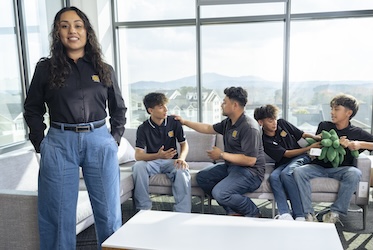
Kennesaw State graduate builds a future few expected
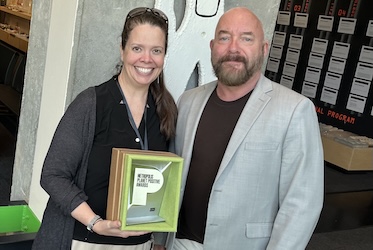
Assistant professor wins Metropolis Magazine Planet Positive Award for sustainability
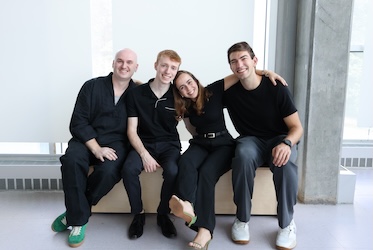
Kennesaw State architecture students earn recognition in international design competition
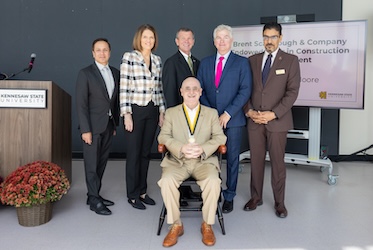
Kennesaw State's Brian Moore installed as Brent Scarbrough and Company Endowed Chair in Construction Management
A leader in innovative teaching and learning, Kennesaw State University offers undergraduate, graduate, and doctoral degrees to its more than 51,000 students. Kennesaw State is a member of the University System of Georgia with 11 academic colleges. The university's vibrant campus culture, diverse population, strong global ties, and entrepreneurial spirit draw students from throughout the country and the world. Kennesaw State is a Carnegie-designated doctoral research institution (R2), placing it among an elite group of only 8 percent of U.S. colleges and universities with an R1 or R2 status. For more information, visit kennesaw.edu.